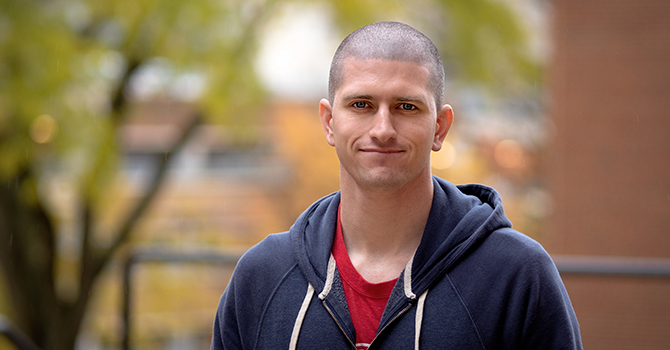Pragmatic Adventures: Information, Evidence, and Decisions for Today

Danny Hicks
Master’s Student in Environmental Health Sciences, Bioenvironmental Engineer, US Air Force
l love the adventure of not knowing what's coming next. I enjoy traveling and trying new foods as well as meeting new people and encountering fresh ideas. And in all of that, there's a beautiful pragmatism to being in the moment and using the tools at hand to make sound decisions.
Because I enjoy the adventure and the discipline of being in the moment in this way, both the Air Force and public health have proven to be good choices for me.
My work is focused on helping people in and around the Air Force stay healthy.
At the Air Force academy in Colorado Springs, I studied biology and also took a heavy course load in engineering. I'm officially a medical officer, but I don't treat anyone. My job title is Bioenvironmental Engineer, and my work is focused on helping people in and around the Air Force stay healthy—from military professionals and their families to the communities located nearby to military bases to veterans living around the nation.
Bioenvironmental work in the military can touch water and air quality on a base or it can mean collecting air samples from someone sandblasting a plane and analyzing for toxins. We're concerned with anything in and around military communities that has a direct impact on human health, especially at the population level.
Michigan Public Health's toxicology program has a national reputation. My advisors inquired with colleagues in environmental health and protection about where I should look for research in computational toxicology, and Michigan was on a very short list of schools they identified.
We’re looking for exposure risks to human health to minimize negative impacts on populations in as narrow a window of time as possible.
I'm working in Dr. Justin Colacino's lab and also working with Dr. Rudy Richardson. Computational toxicology means most or all of my research will be on computers—trying to move from cell and animal models to computer-based models using population data to assess exposure and risk. We're looking for exposure risks to human health, trying to evaluate the specific changes in human health as quickly as possible, and then trying to minimize negative impacts on populations in as narrow a window of time as possible.
It's an honor to be able to work toward improving the health of people in the military community and everyone around us—trying to maximize the benefits to human health from things like vehicles, buildings, and chemicals while also protecting people from the negative risks associated with the manufacturing, transportation, and daily use of those benefits.
If I can provide better information today, we have a chance at better outcomes for human health.
In the military and in environmental health sciences, when you make a decision, it is based on the information you have today. If I can provide better information today to make better decisions, then we have a great chance at better outcomes for human health. I'm fortunate that, in pursuing the adventure of military service, I've also found a pragmatic intellectual passion in my pursuit of public health.
Update: In May 2019, Hicks was promoted to captain in the US Air Force.
